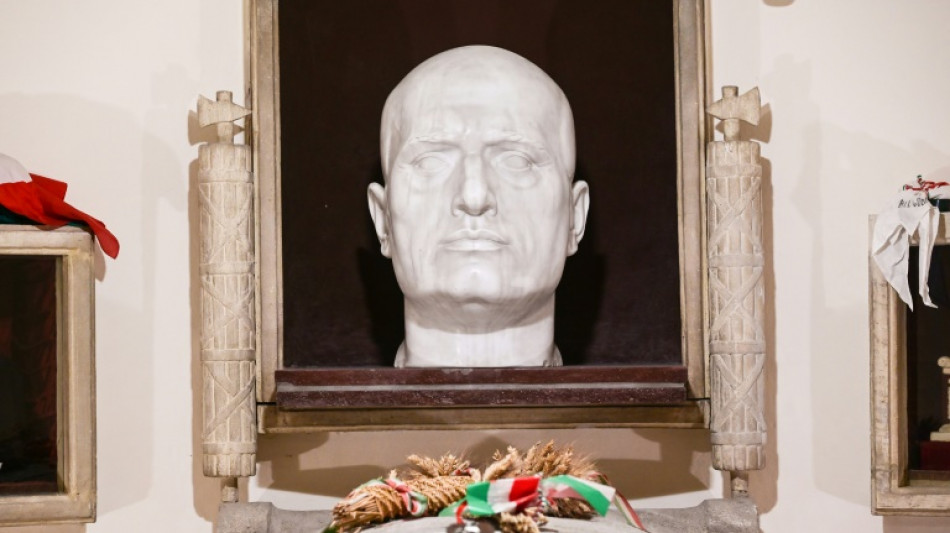
-
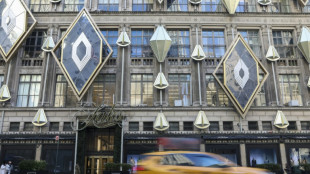 Luxury retailer Saks Global files for bankruptcy
Luxury retailer Saks Global files for bankruptcy
-
Asian markets mostly up with politics bump for Tokyo
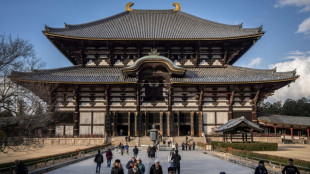
-
 Iran vows fast trials over protests after Trump threat
Iran vows fast trials over protests after Trump threat
-
China's trade surplus hit record $1.2 trillion in 2025

-
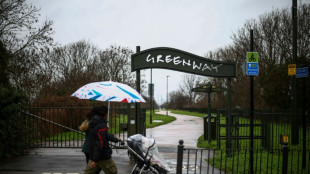 Trail goes cold in UK abandoned babies mystery
Trail goes cold in UK abandoned babies mystery
-
Japan's Takaichi set to call February snap election: media

-
 Scientist wins 'Environment Nobel' for shedding light on hidden fungal networks
Scientist wins 'Environment Nobel' for shedding light on hidden fungal networks
-
From bricklayer to record-breaker: Brentford's Thiago eyes World Cup berth

-
 Keys overcomes serve demons to win latest Australian Open warm-up
Keys overcomes serve demons to win latest Australian Open warm-up
-
As world burns, India's Amitav Ghosh writes for the future

-
 Actor Kiefer Sutherland arrested for assaulting ride-share driver
Actor Kiefer Sutherland arrested for assaulting ride-share driver
-
Gilgeous-Alexander shines as Thunder halt Spurs losing streak

-
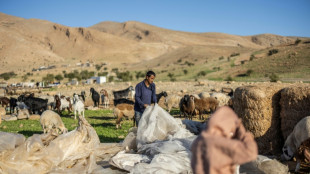 West Bank Bedouin community driven out by Israeli settler violence
West Bank Bedouin community driven out by Israeli settler violence
-
Asian markets mixed, Tokyo up on election speculation
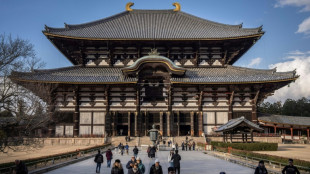
-
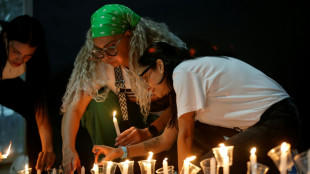 US official says Venezuela freeing Americans in 'important step'
US official says Venezuela freeing Americans in 'important step'
-
2025 was third hottest year on record: EU, US experts

-
 Japan, South Korea leaders drum up viral moment with K-pop jam
Japan, South Korea leaders drum up viral moment with K-pop jam
-
LA28 organizers promise 'affordable' Olympics tickets
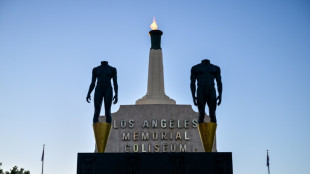
-
 K-pop heartthrobs BTS to kick off world tour in April
K-pop heartthrobs BTS to kick off world tour in April
-
Danish foreign minister heads to White House for high-stakes Greenland talks

-
 US allows Nvidia to send advanced AI chips to China with restrictions
US allows Nvidia to send advanced AI chips to China with restrictions
-
Sinner in way as Alcaraz targets career Grand Slam in Australia

-
 Rahm, Dechambeau, Smith snub PGA Tour offer to stay with LIV
Rahm, Dechambeau, Smith snub PGA Tour offer to stay with LIV
-
K-pop heartthrobs BTS to begin world tour from April

-
 Boeing annual orders top Airbus for first time since 2018
Boeing annual orders top Airbus for first time since 2018
-
US to take three-quarter stake in Armenia corridor

-
 Semenyo an instant hit as Man City close on League Cup final
Semenyo an instant hit as Man City close on League Cup final
-
Trump warns of 'very strong action' if Iran hangs protesters

-
 Marseille put nine past sixth-tier Bayeux in French Cup
Marseille put nine past sixth-tier Bayeux in French Cup
-
US stocks retreat from records as oil prices jump
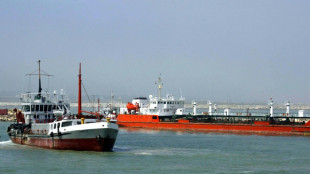
-
 Dortmund outclass Bremen to tighten grip on second spot
Dortmund outclass Bremen to tighten grip on second spot
-
Shiffrin reasserts slalom domination ahead of Olympics with Flachau win

-
 Fear vies with sorrow at funeral for Venezuelan political prisoner
Fear vies with sorrow at funeral for Venezuelan political prisoner
-
Pittsburgh Steelers coach Tomlin resigns after 19 years: club

-
 Russell eager to face Scotland team-mates when Bath play Edinburgh
Russell eager to face Scotland team-mates when Bath play Edinburgh
-
Undav scores again as Stuttgart sink Frankfurt to go third

-
 Fuming French farmers camp out in Paris despite government pledges
Fuming French farmers camp out in Paris despite government pledges
-
Man Utd appoint Carrick as manager to end of the season

-
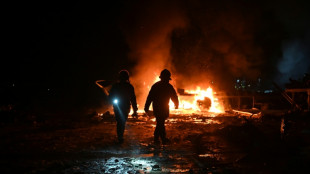 Russia strikes power plant, kills four in Ukraine barrage
Russia strikes power plant, kills four in Ukraine barrage
-
France's Le Pen says had 'no sense' of any offence as appeal trial opens

-
 JPMorgan Chase reports mixed results as Dimon defends Fed chief
JPMorgan Chase reports mixed results as Dimon defends Fed chief
-
Vingegaard targets first Giro while thirsting for third Tour title

-
 US pushes forward trade enclave over Armenia
US pushes forward trade enclave over Armenia
-
Alpine release reserve driver Doohan ahead of F1 season

-
 Toulouse's Ntamack out of crunch Champions Cup match against Sale
Toulouse's Ntamack out of crunch Champions Cup match against Sale
-
US takes aim at Muslim Brotherhood in Arab world

-
 Gloucester sign Springbok World Cup-winner Kleyn
Gloucester sign Springbok World Cup-winner Kleyn
-
Trump tells Iranians 'help on its way' as crackdown toll soars

-
 Iran threatens death penalty for 'rioters' as concern grows for protester
Iran threatens death penalty for 'rioters' as concern grows for protester
-
US ends protection for Somalis amid escalating migrant crackdown


100 years on, nostalgia for Fascism persists in Italy
On October 28, 1922, Benito Mussolini's Fascist blackshirts entered Rome, marking the start of a dictatorship still viewed today with some indulgence in Italy.
The centenary of the so-called March on Rome on Friday comes days after far-right leader Giorgia Meloni was named Italy's new prime minister, renewing debate on the legacy of Fascism.
Although Meloni's Brothers of Italy party has neo-fascist roots, in her first speech to parliament this week she insisted she had "never felt sympathy or closeness to undemocratic regimes... including Fascism".
Yet unlike in Germany or Spain, where only a handful of extremists still revere Adolf Hitler or the Franco dictatorship, attitudes to Mussolini in Italy are more ambiguous.
As recently as 2013, then-Prime Minister Silvio Berlusconi said the racial laws against Jews were "the worst mistake of a leader, Mussolini, who in many other ways had done well".
- Shameful racial laws -
Berlusconi, a billionaire media mogul whose right-wing Forza Italia party is back in government as part of Meloni's coalition, is known for his outbursts.
But the sentiment is not uncommon, notes Valerio Alfonso Bruno, an analyst at the Centre for Analysis of the Radical Right in London.
"A large part of the population has never truly come to terms with Fascism," he told AFP.
Mussolini's authoritarian, anti-democratic regime celebrated military might and intense nationalism.
In Italy, there remains "this cult of the strong personality, the strongman, the autocrat who governs without worrying about democracy", Bruno said.
Mussolini is praised for having provided Italy with much-needed infrastructure, from trains to highways, as well as social welfare programmes -- even if many of these projects were already underway when he took office.
Few, however, defend his record on the race laws. From 1938, the regime began stripping rights from Jews, banning them from public office, forbidding intermarriage, permitting the confiscation of their property and eventually their internment.
Under Mussolini's regime, which ran until July 1943, more than 7,000 Italian Jewish men, women and children were murdered in the Nazi death camps.
In her speech on Tuesday, Meloni called the race laws "the lowest point in Italian history, a shame that will mark our people forever".
Berlusconi's 2013 remarks, on the sidelines of a ceremony marking Holocaust Remembrance Day in Milan, were condemned by the centre-left and many others.
They showed "the extent to which Italy still has trouble seriously accepting its own history and its own responsibilities", the head of the Union of Italian Jewish Communities, Renzo Gattegna, said at the time.
Gattegna's observation is still relevant today.
- 'Heirs of Il Duce' -
According to an October 2021 poll, 66 percent of 16- to 25-year-olds believe Mussolini's Fascist regime was a dictatorship that must be condemned in part, but which also had beneficial effects.
Only 29 percent of those questioned by the Ipsos research institute, on behalf of a national association of former deportees, said Mussolini was to be entirely condemned.
And for five percent, Fascism was considered a positive form of government.
While today, statues of controversial historical figures are being removed in countries such as the United States and Britain, physical reminders of "Il Duce" remain intact throughout Italy.
An obelisk inscribed with the words "Mussolini Dux" still sits a stone's throw from the Olympic stadium in Rome, with no note of context.
Portraits of the dictator still adorn the walls of some government ministries.
And while a post-war law bans the apology for -- or justification of -- Fascism, it is not enforced. Websites flourish online praising the memory of the "ventennio," the two decades Mussolini was in power.
In Predappio, a small town in northern Italy where Mussolini was born and buried, his tomb in the family chapel attracts tens of thousands of visitors each year.
"This memory is certainly tolerated, not just in Predappio," said analyst Bruno. And in recent years, he added, this tolerance of Fascism had increased.
"We are all heirs of Il Duce," said Ignazio La Russa, a member of Meloni's Brothers of Italy party. Recently elected speaker of the Senate, he was speaking on television only last month.
La Russa, who collects Fascist memorabilia including busts of Mussolini, had days earlier been forced to condemn his brother for giving the fascist salute at the funeral of a far-right activist.
L.Hussein--SF-PST




